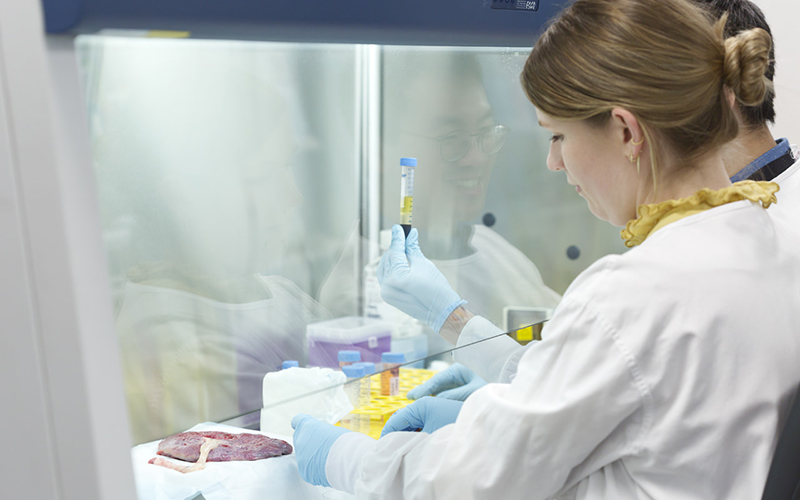
Four The Kids Research Institute Australia-based biobanks which underpin a range of cancer, respiratory and early life research have received more than $450,000 in funding thanks to the State Government’s Biobank Interim Support Program 2021.
Biobanks are large, carefully stored collections of human biological materials – such as blood, cell and tissue samples – used by researchers to better understand human health and disease and to search for potential treatments.
The interim funding, supported by the State Government’s Future Health Research and Innovation Fund, has been made available while a new State biobanking model is developed.
Sixteen WA biobanks were funded under the scheme, including four based at The Kids Research Institute Australia: ORIGINS Biobank, the The Kids Cancer Centre Biobank, the Wal-yan Respiratory Centre Cystic Fibrosis Biobank, and the Western Australian Epithelial Research Program biobank.
- ORIGINS Biobank, overseen by ORIGINS co-director Professor Desiree Silva awarded $170,735.
This biobank is part of the decade-long ORIGINS – a collaboration between The Kids Research Institute Australia and Joondalup Health Campus – and supports local, national and international research into how a child’s early environment and their parents’ health and genetics influence their lifetime health and disease. The biobank holds more than 270,000 samples collected from 6,300 ORIGINS mums, partners and children. Expected to reach a store of 750,000 by 2027, samples include blood, cord blood, saliva, placentas, breastmilk, urine, stools, hair and house dust, which are being used to improve understanding of the impact of metabolism and immune function, bacteria, allergens and environmental contaminants on health, development, gene activity and more.
- The Kids Research Institute Australia Cancer Centre Biobank, overseen by Professor Terrence Johns, awarded $156,535.
This biobank contains tumour and tissue specimens provided with consent by patients. The samples support vital research into a range of childhood cancers, with a goal of improving treatment outcomes. The biobank follows stringent guidelines and is a collaborative effort between pathologists, medical oncologists, surgeons, The Kids Cancer Centre researchers, and community members.
- The Wal-yan Respiratory Centre Cystic Fibrosis Biobank, overseen by Professor Stephen Stick, received $64,872.
Based at the Wal-yan Respiratory Research Centre – a powerhouse partnership between The Kids Research Institute Australia, Perth Children’s Hospital Foundation and Perth Children’s Hospital – this biobank holds a collection of more than 40,000 blood, fluid, exhaled breath condensate and other samples collected over the past 20 years from research participants with cystic fibrosis (CF). More than 20 international research collaborations currently use the biobank for research that seeks to improve the management of CF and other respiratory conditions.
- The Western Australian Epithelial Research Program biobank – overseen by Associate Professor Anthony Kicic, of the Wal-yan Respiratory Research Centre and Curtin University – received $59,028.
This biobank collects and freezes airway cells from children and adults, both with and without asthma and/or allergies. The cells are later used to recreate 3D structures of the lung for use in research projects, while DNA and RNA collected at the same time support genetic studies of respiratory processes.
Health Minister Roger Cook said biobanking might not be a term all Western Australians are familiar with, but it was something everyone could benefit from.
"Samples donated by people directly to a biobank or through a research study are collected, stored and catalogued according to best practice processes, ensuring these bio-specimens can be used in important future research,” Mr Cook said.
The Kids Research Institute Australia Director, Professor Jonathan Carapetis, said the funding represented a welcome investment into what was a critical research tool.
Well-run biobanks are wonderful resources which make it possible for researchers to find answers to questions about human health and disease both now and far into the future, using technology which may not have existed at the time the samples were taken.
“Each of these four biobanks often support countless studies, not just here in Western Australia but across Australia and internationally. None of this work could be undertaken nearly as successfully without these valuable specimen collections.”
For more information on the funding, see Mr Cook’s media release here. For the complete list of grant recipients, see the Future Health Research and Innovation Fund website.
- The ORIGINS, Cancer Centre and Cystic Fibrosis biobank grants will be administered by The Kids Research Institute Australia on behalf of the Centre for Child Health Research, The University of Western Australia.
- The Western Australian Epithelial Research Program biobank grant will be administered by Curtin University.
